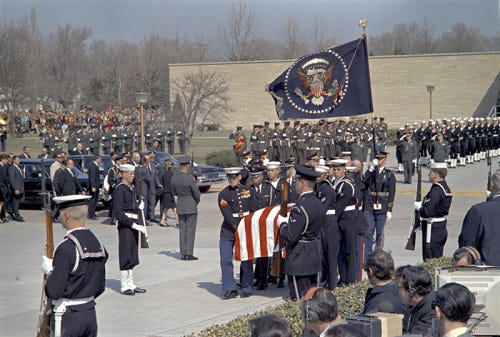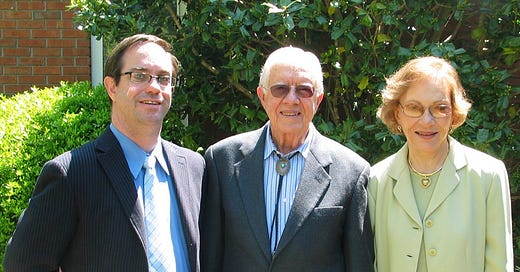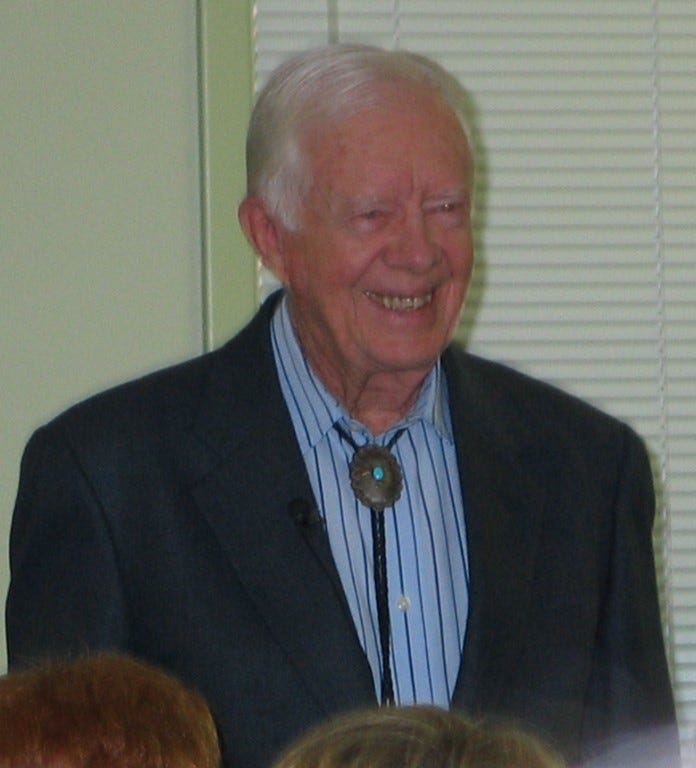On this National Day of Mourning, much will be said about President Jimmy Carter. Yet I wish to honor his life and legacy, as you’d expect, by looking at what we can all learn from how President Carter communicated with and without using words. While I’ve been in the presence of six US Presidents, Jimmy Carter is the only one I can say I’ve met. In April of 2007, while at Emory University for an MCA conference, I stayed over an extra day and drove to Plains, Georgia, to hear the former President teach Sunday School at Maranatha Baptist Church. Following the service, he and Rosalynn graciously stood for hours to chat with visitors and pose for pictures.
I cannot remember now, over 17 years later, what he taught in his Sunday School lesson. But I vividly recall how much I learned from his simple, accessible style of servant leadership that bright Sunday morning. It was a lifelong dream of mine to meet the man who was the first President with whom I felt a connection. He was our longest-lived President in US History and the first Democratic President to die since Lyndon Johnson in 1973, more than half a century ago. Carter served our nation while I finished junior high and began high school. During that brief time in my life, I dreamed of someday running for President myself. I even wrote an essay in Mrs. Rohr’s 7th grade English class about my dreams to run once I passed the age of 35.
It was Carter’s mission to heal the divisions in our nation after Watergate that fueled my optimism that I could someday make a difference, too.
This past week, I pored over the media reports and tributes, recalling many facts that I had forgotten, and learning a few new ones. When I was tired of that, I turned to the cinema and watched Jimmy Stewart again in Mr. Smith Goes to Washington, recalling the unlikely election of an unknown person to a high office with even higher ideals. Vivid parallels exist between the fictional Senator Jefferson Smith and former President Jimmy Carter, and the film is worth a watch or re-watch.
To be true to the mission of this newsletter, I offer today two contrasting examples of leadership communication that I will share as my personal tribute to Carter’s life, examples from which we all can learn. (To be clear, I strive to avoid partisanship in this space, but I also believe that all of us can learn from these examples, even if his policies do not match our own. To remain balanced, I invite you to also read my post about lessons drawn from Barbara Bush at her passing.)
Trusting yourself to go off script – It’s tough to pull just one moment from the past century, but this story about Carter’s ability to take a risk and depart from his prepared manuscript shines brightly. In May 1974, he delivered an address at the University of Georgia’s Law Day. His Democrat colleague and future rival, Ted Kennedy, spoke first and delivered many of the same points then Governor Carter planned to make. Carter chose, instead, to speak extemporaneously to a roomful of powerful lawyers and legal minds. The story goes that over lunch, he redrafted his remarks with a handwritten outline. He took the assembled audience to task for their role in perpetuating a legal system that was substantively unfair to the poor and marginalized. The distinguished alumni sat in stunned silence when he concluded.
This speech—remarks really—might have been forgotten were it not for the only journalist in attendance who tape-recorded it and documented it for The Rolling Stone Magazine. Hunter Thompson came to Georgia with no intention of covering anybody but Ted Kennedy. Carter’s unprepared remarks, clearly from his heart, changed all that. Thompson became a fierce advocate for Carter’s candidacy for President, saying the Law Day speech was the: “heaviest and most eloquent thing I have ever heard from the mouth of a politician.” His later endorsement on the pages of Rolling Stone went back to this speech, saying it was “a lot better reason to vote for him than anything I’ve seen or heard on the campaign trail.” Carter took the risk to trust his gut and speak his mind; remarkably, it took only one member of the audience to amplify that and effectively launch him toward the White House.
Letting actions speak more than words – While others who held the office of President may be remembered for greater gifts of rhetoric, it’s clear that Carter let his actions as a peacemaker, humanitarian, and homebuilder demonstrate to us all that what we do often speaks much louder than what we say. Those who saw him build homes for Habitat for Humanity know this. Those who witnessed him overseeing elections around the world know this. In a small way, I saw this on the lawn of the Baptist church where, with his characteristic broad smile, he greeted hundreds that day who simply wanted a photo with him.
It’s been reported that he got into hot water with other US Presidents of both parties when he chose to travel and interact diplomatically on the world stage, being an example of humanitarian behavior he was not seeing demonstrated by other administrations. With Jimmy Carter, there was an unvarnished authenticity to his actions. He embodied integrity in his actions and beliefs that many have come to admire and appreciate.
Today our nation lays to rest what presidential historian Jon Meacham calls “a complicated man driven by ambition and service.”
I believe the greatest tribute we can offer this man is to look for ways in our own lives and leadership where we can trust our gut and take a risk, and, mostly, let our actions speak louder than our words.
Epilogue: how one president’s funeral sparked my fascination with US Presidents

I mentioned at the start that I’ve been in the presence of six Presidents (curiously, all of them but one, Richard Nixon, after they left office). It was my occasion of seeing the first three together that ignited my fascination with the office of the President and how we mourn and memorialize these leaders. My first Presidential sighting was in April 1969 when my dad loaded us all in the family Oldsmobile to drive two hours to Abilene and witness Dwight Eisenhower’s funeral. At just four years old, I can recall the smell of Brylcreem in my dad’s hair more as I sat on his shoulders than the sight of President Richard Nixon and former Presidents Harry Truman and Lyndon Johnson paying their final respects to the “Man from Abilene.” My fascination has endured, and I’ve visited many presidential libraries over the years, with several more yet to see.
JD’s Recommendations: what I’m reading, hearing, and seeing:
Reading: My colleague and friend Frank Flynn offers a SIMPLE framework to distinguish yourself from the pack.
Hearing: Over the break, I devoured the audiobook of Joan Garry’s Guide to Nonprofit Leadership, and now I’m working through her archive of Nonprofits are Messy podcasts.
Seeing: While nearly everyone is praising the new film “Wicked,” allow me to offer this great medley by the One Voice Children’s Choir with all of the show’s greatest songs.







Good story!
Thank you for sharing this story. I truly appreciate President Carter more now that I read your piece.